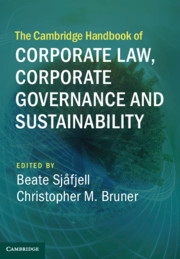Book contents
- Reviews
- The Cambridge Handbook of Corporate Law, Corporate Governance and Sustainability
- The Cambridge Handbook of Corporate Law, Corporate Governance and Sustainability
- Copyright page
- Dedication
- Contents
- Contributors
- Forewords
- Preface
- Introduction
- Part I Global Business and Fragmented Regulation
- Part II Corporate Law, Financial Markets and Sustainability
- Part III Corporate Law, Corporate Governance and Sustainability: Case Studies
- Part IV Potential Drivers for Change
- 37 Disclosure Regulation and Sustainability
- 38 Sustainability Reporting in Africa
- 39 Global Supply Chains and Sustainability
- 40 Aligning Social Investing with Nature’s Timescales
- 41 Shareholder Stewardship
- 42 Green Bonds and Beyond
- 43 Conflicts and Coalitions
- 44 Gender as a Catalyst for Corporate Reform
- 45 Amenable Controls
- 46 Social Enterprise Law
- 47 Certifying ‘Good’ Companies
- 48 The Cooperative as a Platform for Sustainable Business Operations
- 49 Realising the Potential of the Board for Corporate Sustainability
- Conclusion
- Index
45 - Amenable Controls
How Companies Influence Laws, Reputation and Morals
from Part IV - Potential Drivers for Change
Published online by Cambridge University Press: 25 November 2019
- Reviews
- The Cambridge Handbook of Corporate Law, Corporate Governance and Sustainability
- The Cambridge Handbook of Corporate Law, Corporate Governance and Sustainability
- Copyright page
- Dedication
- Contents
- Contributors
- Forewords
- Preface
- Introduction
- Part I Global Business and Fragmented Regulation
- Part II Corporate Law, Financial Markets and Sustainability
- Part III Corporate Law, Corporate Governance and Sustainability: Case Studies
- Part IV Potential Drivers for Change
- 37 Disclosure Regulation and Sustainability
- 38 Sustainability Reporting in Africa
- 39 Global Supply Chains and Sustainability
- 40 Aligning Social Investing with Nature’s Timescales
- 41 Shareholder Stewardship
- 42 Green Bonds and Beyond
- 43 Conflicts and Coalitions
- 44 Gender as a Catalyst for Corporate Reform
- 45 Amenable Controls
- 46 Social Enterprise Law
- 47 Certifying ‘Good’ Companies
- 48 The Cooperative as a Platform for Sustainable Business Operations
- 49 Realising the Potential of the Board for Corporate Sustainability
- Conclusion
- Index
Summary
What happens when sustainability concerns clash with the company’s bottom line? On paper, various systems should deter unsustainable behavior: fear of liability (legal sanctions), diminished business opportunities (reputational sanctions), or guilty feelings (moral sanctions). Yet, in reality, companies do not take these legal, reputational, and moral sanctions as given. They rather count on their ability to dilute the expected sanctions. Companies reduce the probability of being caught by controlling the information environment and creating plausible deniability. They are often the ones dictating the public perception of whether they behaved sustainably or not. Companies can also dilute the sanction that is imposed once they are caught, by capturing the regulators, and reducing the guilt associated with immoral behavior. Recognizing that all systems of control can be gamed opens up space for rethinking policy implications, such as designing the legal system in ways that balance the non-legal systems’ areas of malleability.
- Type
- Chapter
- Information
- Publisher: Cambridge University PressPrint publication year: 2019
- 2
- Cited by



